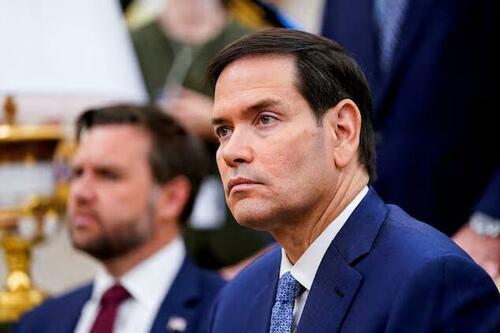Submitted by Thomas Kolbe,
U.S. Secretary of State Marco Rubio has launched a lobbying campaign against the EU’s Digital Services Act. With this step, Americans have become the last line of defense for the free speech rights of EU citizens.

If, in the past, U.S. President Donald Trump often spoke of the European Union as “a tough nut to crack,” he couldn’t have been more accurate. Freedom-loving EU citizens know exactly what he meant. In Brussels, a bizarre mélange of control fetishism, economic dirigisme, and isolation from the outside world has developed—a combination that is no longer tolerable.
Not least, Brussels’s fight against free expression in the digital sphere has revealed the true intentions of the von der Leyen Commission: the recovery of narrative dominance and control over political dissidence—achieved by cold-bloodedly sacrificing citizens’ fundamental freedoms.
U.S. Vice President J.D. Vance already issued multiple warnings in the spring about a European censorship empire. In a speech in the U.S. Senate, he denounced European digital legislation as an attack on Western liberties. In his address at the Munich Security Conference, he went so far as to suggest cutting ties with the Europeans if they did not reverse their illiberal, dictatorial trajectory.
Criticism Bounces Off
As usual, American criticism fell on deaf ears in Brussels. Although Brussels swallowed the bitter pill of an asymmetrical trade deal with the U.S. two weeks ago, both the hidden protectionism disguised as climate regulation and harmonization standards, as well as the repressive digital laws, remain intact. This is detrimental not only to free speech among Europeans but also for American companies—undoubtedly a key target of the EU censors.
The EU’s discriminatory ambitions through the Digital Services Act (DSA) and the corresponding Digital Markets Act (DMA) primarily target U.S. communication platforms like X, Telegram, and Meta. If these platforms don’t conform to EU rules—granting access to internal communications and aiding Brussels’s surveillance efforts—they face billions in fines.
Much like Britain’s digital ID program, Brussels now masks its shamelessly invasive censorship with claims of youth protection and anti-hate measures. It’s tiresome to hear—but, as always, it’s about “their democracy,” or, to put it more accurately, a massive concrete barrier constructed to shield against the audacious citizen seeking to preserve privacy from an unbounded EU bureaucracy.
Next Round with Rubio
It seems Americans, even before EU citizens, have finally lost patience with Brussels. U.S. Secretary of State Marco Rubio is next in line to confront the EU Commission, stepping into attack mode. This week, Rubio instructed all U.S. embassies across the EU to initiate a coordinated lobbying blitz against Brussels’s censorship package surrounding the DSA.
The allegation: Under the guise of security and responsibility, the EU is deliberately suppressing free speech in digital spaces and targeting U.S.-based platforms and communication companies. Rubio has tasked his diplomats with urging governments and regulators to amend the DSA. At the same time, they are to record and report censorship incidents involving U.S. citizens and companies to ramp up pressure for reform.
This marks another daring challenge from Washington to the EU’s expansive control apparatus.
The trade war between the U.S. and the EU has now shifted fully into the digital realm. Brussels’s response to Rubio’s initiative was swift. In an official statement, the EU Commission flatly dismissed the censorship allegations: “The claims of censorship connected to the DSA are entirely baseless. Freedom of expression is a core right in the EU.” They added coldly: “Our EU regulations and standards were never up for discussion—and they will not be.” In other words, Brussels refuses to be swayed in building its digital citadel of narrative control—least of all by Washington.
Loss of Narrative Control
The U.S. attempt to protect its businesses from EU overreach draws them into a broader clash between EU citizens and Brussels’s increasingly omnipotent central authority. Brussels senses growing public pressure and feels exposed amid a deepening economic crisis.
Grand narratives—like human-caused climate change and the need for open borders to avert a demographic crisis—are eroding public consensus and exposing Brussels’s failed centralization of Europe’s economy. We are witnessing Brussels’s last desperate stand to defend its narrative monopoly against a rising opposition that is increasingly reclaiming public and media spaces.
What happens in the U.S. now matters fundamentally for EU citizens. Under President Trump’s administration, Europe-inspired climate agendas are being reversed, and funding for public media and NGOs is being rolled back.
The air is clearing—spaces open for fresh discourse and honest reckoning with recent history. Brussels’s errors in climate dirigisme and centralized planning are now apparent for all to see.
It would be unthinkable today in the U.S. for a leading figure like Ursula von der Leyen to quietly escape scandal—say, over the Pfizer-Corona controversy. That is the political maturity that Washington exemplifies and Brussels starkly lacks.
The Turning Point Is Here
This shift in public discourse owes much to initiatives like Elon Musk’s acquisition of Twitter and renewed defense of free speech on platforms like Telegram. These are spawning counter-narratives that expose Brussels’s planning failures by setting them against reality. We are emerging from Plato’s cave, seeing who cast the shadows on our walls.
Washington’s interests may be economic—but they resonate with EU citizens. Those in the EU who yearn for a return to a Brussels central authority that oversees fair competition in an open single market should feel gratitude for unexpected U.S. solidarity. It is the strongest alliance we could ask for. Brussels’s push for centralization and power armor has outrun democratic checks—and that is dangerous.
Thomas Kolbe, a German economist, has worked as a journalist and media producer for over 25 years. As a publicist, he focuses on economic processes and observes geopolitical events from the perspective of the capital markets. His publications follow a philosophy that focuses on the individual and their right to self-determination.
Loading recommendations…


